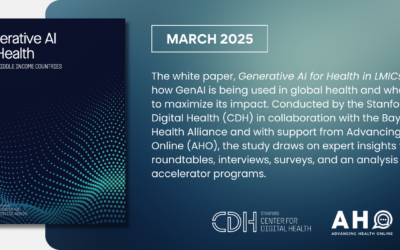As the potential impact of generative AI (GenAI) on health in low- and middle-income countries (LMICs) continues to be explored, two key questions emerge: Where is GenAI currently being used most effectively, and how can its full potential be unlocked for greater impact, both for behavior change and broader healthcare applications? A newly released white paper sheds light on these questions, offering insights from a comprehensive review led by the Stanford Center for Digital Health (CDH) with support from Advancing Health Online (AHO) and the Bay Area Global Health Alliance as lead dissemination partner.
Search
Events
MEMBERS
- 19Labs
- AbbVie
- Accenture
- Africa Health Business
- AIfluence
- Airbnb
- Americares
- Ananya Health
- Antara International
- Baraka Impact Finance
- Boston Consulting Group
- CCBRT
- Cepheid
- Chevron
- Clinton Global Initiative
- Connective Impact
- Consortium of Universities for Global Health
- Cross-Border Impact Ventures
- Ending Pandemics
- ETR
- Fistula Foundation
- Friends of Chidamoyo
- Friends of the Global Fight
- GAIA Global Health
- Gilead Sciences
- Global Environment & Technology Foundation
- Global Fund for Women
- Global Health Corps
- Global Health Council
- Global Health Technologies Coalition
- Global Impact Advisors
- Global Strategies
- HealthAI
- Hesperian Health Guides
- HOPO Therapeutics
- Ideo.org
- Ipas
- John Snow, Inc.
- Kainomyx
- Kapnek Trust USA
- Kupona Foundation
- L.E.K. Consulting
- LivingGoods
- Mastercard
- Maya Health Alliance
- Medicines360
- MedShare
- Merck
- Meta
- Nivi
- North Carolina Global Health Alliance
- OmniVis
- OPHID
- PATH
- Pathfinder International
- Pendulum
- Pfizer
- Planetary Health Alliance
- Population Services International
- Public Health Institute
- Resonance
- ReSurge International
- Roche Diagnostics
- Sabin Vaccine Institute
- San Francisco Community Health Center
- Seed Global Health
- Simprints
- Stanford University
- — Stanford University Byers Center for Biodesign
- — Stanford University Center for Innovation in Global Health
- — Stanford University School of Medicine
- Street Business School
- Tiba Foundation
- UK Science & Innovation Network
- UNICEF
- University of California
- — UC Berkeley
- — UC Berkeley Center for Emerging and Neglected Diseases
- — UC Berkeley Haas School of Business
- — UC Berkeley School of Public Health
- — UC Davis
- — UC Davis Institute for Pandemic Intelligence
- — UC Global Health Institute
- — UCSF
- — UCSF Institute for Global Health Sciences
- UpSwell
- Viamo
- Vir Biotechnology
- Washington Global Health Alliance
- Watsi
- World Health Organization
- World Telehealth Initiative
- YLabs
- Zenysis
TOPICS
REGIONS
- Africa
- — Cameroon
- — Côte d’Ivoire
- — Ethiopia
- — Guinea
- — Kenya
- — Malawi
- — Mozambique
- — Niger
- — Rwanda
- —— Kigali
- Asia
- — Nepal
- — Pakistan
- — Bangladesh
- — Indonesia
- —— Bali
- — Israel
- Europe
- — Switzerland
- —— Geneva
- South America
- — Brazil
- North America
- — California
- —— Berkeley
- —— Los Angeles
- —— Sacramento
- —— San Francisco
- —— Stanford
- — New York
- —— New York City
- — North Carolina
- —— Durham
- — Washington
- —— Seattle
- — Washington D.C.
An Alliance Conversation with Baraka Impact Finance: The Role for Private Sector Capital in The Funding of Global Health Solutions
On July 20 at UCSF, the Bay Area Global Health Alliance hosted Baraka Impact Finance for a conversation on innovative financing for global health in emerging markets. The discussion highlighted the potential of private capital to drive impactful health solutions, the growing interest in impact-focused investments, and the need for greater collaboration between investors, entrepreneurs, and nonprofits to address the challenges faced in global health financing.

